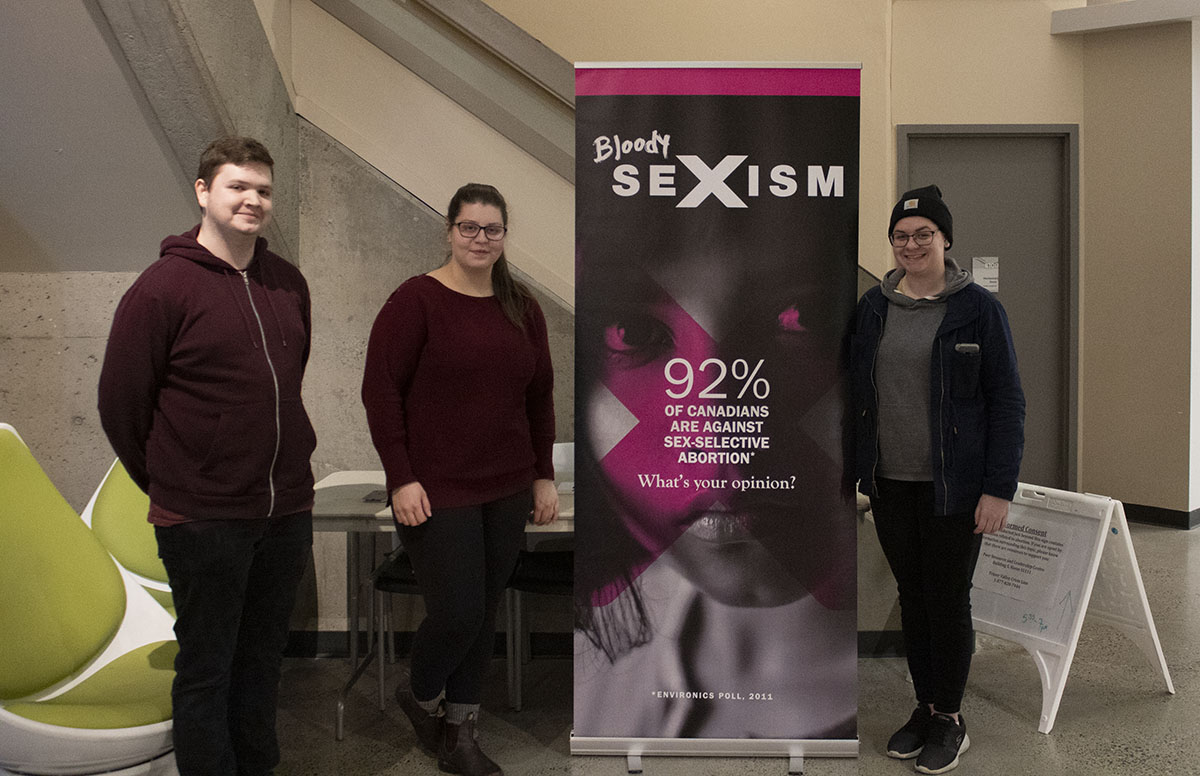UFV Students for Life, a new student anti-abortion club, ran a tabling event outside the cafeteria in Building B on Feb. 12 and 13, where they invited passing students to talk about abortion in Canada.
“We are categorically against abortion in all circumstances, and we want to invite the UFV community to participate in the discussion … and hopefully change some minds who might lean pro-choice because we think we have a pretty convincing position,” Rachael Keras, the president of UFV Students for Life, said.
Past pro-life events on campus such as another tabling event in 2015, which included loud music and plastic fetuses, and the 10,000 flags display in 2016 have been criticized for being strategically held on the Green, which is one of the most heavily traversed places on campus. Holding events there, critics noted, made it difficult for students to opt out of attending the events.
UFV Students for Life did not hold their event on the Green, but chose an area near the cafeteria doors in Building B.
“We’re looking forward to seeing what the reaction will be, and obviously this area is maybe the prime spot. We’re just experimenting,” Keras said.
Unlike in previous years, an informed consent sign stood on either side of the group’s table, advising oncoming students that the event conducted beyond “contained information related to abortion.” These were required and erected by the university, though the wording was mutually agreed upon by the university and Keras.
UFV Students for Life is not connected to the defunct UFV Life Link group who planted the 10,000 pink and blue flags on the Green in 2016, each representing 10 of the 100,000 embryos and fetuses aborted in Canada each year. However, Kyle Baillie, the director of Student Life and Development at UFV, said over email that the university’s approach to UFV Students for Life’s event was informed by students’ response to the flag event.
“Keeping people informed prior to the event and during the event can help to answer questions people have, reduce anxiety, and dispel rumours,” Baillie said.
UFV Students for Life’s display consisted of a table holding a laptop, and a vertical pink banner that read, “92% of Canadians are against sex-selective abortion. What’s your opinion?” Sex-selective abortion is the practice of aborting fetuses based on their sex. In most cases, the term is used to refer to parents aborting female fetuses in order to have sons rather than daughters, and was the focus of the event.
“It happens a lot in China and India and other poor parts of the world for various political and cultural reasons,” Keras said. “But a lot of times when those people from other cultures come here, there’s a statistic that shows that actually girls are being, especially in those communities, disproportionately killed in the womb because, culturally, boys are preferable.”
According to Keras, UFV Students for Life intended to hand out small cards with abortion statistics and a photograph of an aborted fetus, but they had to choose between giving out the cards or being in a common area given the sensitive nature of the photograph.
“While Charter rights to freedom of expression would normally apply in any public spaces, the BCCLA vs. UVIC (2016) decision found that university common space is Charter exempt in this regard,” Baillie said, expressing concern that inadvertently seeing graphic material could be distressing to students or staff. The latter, he said, could constitute a violation of WorkSafeBC regulations.
The cards, as well as the banner and a survey participants were asked to fill out, were provided by the National Campus Life Network, which Keras said UFV Students for Life is partnered with.
UFV Students for Life will be holding group discussions on abortion in the coming weeks, and invite students from all perspectives to join the conversation.
“We believe that our position is reasonable, and we believe that if you believe in logic and if you believe in reason, and if you believe in science and if you believe in justice, then you will come to the same conclusion as us. And you will see that there is a real and expansive human rights violation happening in Canada every single day. And we want it to end,” Keras said.
Declaration of conflict: The writer of this piece was one of the students protesting against the 10,000 flags event in 2016.
Correction, February 27th, 2020: A previous version of this piece incorrectly stated Rachael Keras’ name as Rachel Keras.
Image: David Myles/The Cascade


